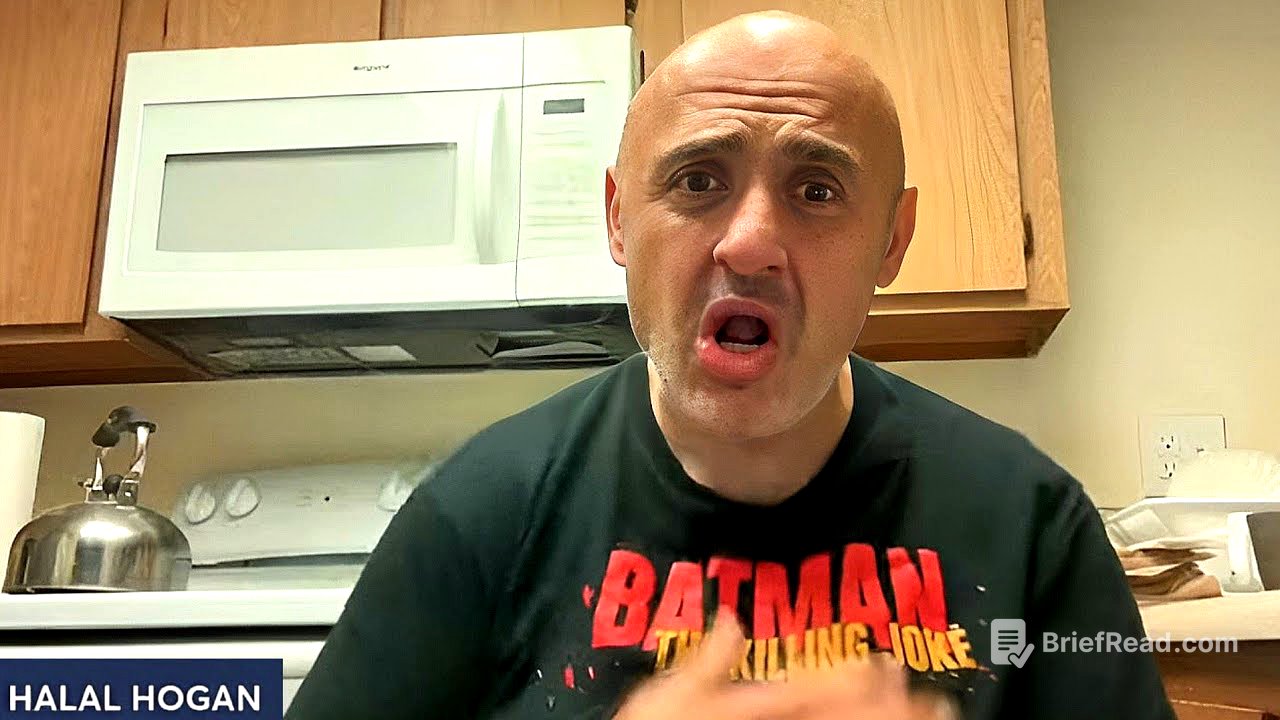TLDR;
This video captures a theological debate about the Catholic Church and the practice of praying to saints. The discussion begins with a direct question about whether the Catholic Church is a false church, leading to a detailed examination of veneration, idolatry, and the communion of saints. The key points include:
- The definition of a false church and whether the Catholic Church fits that definition.
- The biblical basis for asking saints in heaven to pray for those on Earth.
- Scriptural interpretations regarding prayer, sin, and the effectiveness of prayers from those in heaven versus those on Earth.
Is the Catholic Church a False Church? [0:01]
The video starts with the host asking directly whether the Catholic Church is a false church. He defines a false church as one that preaches a false gospel and will be destroyed by Jesus, though some individuals within it may still be saved. The guest initially avoids a direct answer, prompting the host to press him on his beliefs and accusing him of being a coward for not stating his position clearly. The host references Revelation 22:15 and 21:8, which list the fate of cowards and other sinners. After repeated questioning, the guest concedes that, based on the definition provided, he does believe the Catholic Church is a false church.
Veneration vs. Idolatry [3:14]
The host challenges the guest, who is 25 years old, for judging nearly 2,000 years of tradition. The discussion shifts to the veneration of images and whether it constitutes idolatry. The host defines veneration as honouring an image for what it represents, similar to cherishing a family photo. The guest initially agrees this isn't idolatry, but then clarifies that he considers it idolatry to ask Mary in heaven to pray for someone. The host demands scriptural proof that asking someone in heaven to pray for you is idolatry.
The Burden of Proof and Scriptural Support [5:05]
The host accuses the guest of using a "Muslim tactic" by making an assertion without proof and shifting the burden of proof. He insists that since the guest claims asking for prayers from those in heaven is idolatry, he must provide a verse to support this claim. The guest attempts to point to Jesus's teachings on prayer, but the host argues that this proves too much, as the Lord's Prayer doesn't explicitly mention praying to Jesus or the Holy Spirit either. The host challenges the guest to show where Jesus instructs people to pray to him in the passages the guest cited (Matthew 6:9-13 and Luke 11:1-4).
The Totality of Scripture and Praying to the Holy Spirit [8:31]
The guest admits that the specific prayer doesn't include praying to Jesus, leading the host to state that the guest is using the same argument Muslims use to condemn Christians for praying to Jesus. The guest then tries to broaden the argument to the "rest of scripture," but the host insists on sticking to the original question. The host reiterates his demand for a verse that forbids asking someone in heaven to pray for you, and the guest admits there isn't one. The host then makes the case that just because the Bible doesn't explicitly command something (like praying to the Holy Spirit), it doesn't mean it's wrong if it aligns with broader theological principles.
Communion of Saints: A Scriptural Defence [12:28]
The host begins to build a case for the communion of saints, starting with the agreement that the Bible tells believers to pray for one another (James 5:13-16). He then establishes that those in heaven are alive, glorified, and sinless (Luke 20:37-38, Romans 4). The host asks if the guest agrees that those in heaven are aware of events on Earth, referencing Hebrews 12:1. By agreeing to these points, the host argues, the guest has inadvertently proven the communion of saints.
The Effectiveness of Prayers and Heavenly Church [14:10]
The host continues to build his argument, asserting that the prayers of those in heaven are more effective because they are sinless. He references James 5:13-16, noting that the fervent prayer of a righteous person is powerful. The host then cites Hebrews 12:22-24, which describes the spirits of the righteous made perfect in heaven, and Revelation 6:9-11, where the souls of the martyred are praying for vengeance. The host highlights that Hebrews 12:22-24 describes a church in heaven, implying prayer is part of their activities.
Heavenly Church and Praying in Heaven [16:07]
The guest questions how Mary could hear prayers, but the host reminds him that he agreed those in heaven are aware of earthly events. Reading from Hebrews 12:22-24, the host points out the existence of a church in heaven. He asks what activities take place in church, establishing that prayer is a key component. The host concludes that the guest has scripturally proven the communion of saints by acknowledging that perfected, sinless believers are praying in heaven.
Why Ask Saints to Pray? [19:27]
The guest asks why one shouldn't just pray directly to Jesus. The host counters by asking why the guest asked him to pray for him, suggesting that sometimes people need help or don't know how to pray effectively. He also points out that sin can hinder prayers (1 Peter 3:7, Isaiah 59:1-2, Psalm 66:18), implying that the sinless in heaven can offer more effective prayers.
Sin, Repentance, and the Prayers of the Righteous [22:29]
The host uses the example of a pastor refusing to pray for someone in unrepentant sin to illustrate that even on Earth, the prayers of the righteous are more effective. He references Revelation 6:9-11, where the souls under the altar cry out for justice, not mercy, on their persecutors. The host concludes that those in heaven, who perfectly hate sin, would likely pray for God's discipline on unrepentant sinners.
Conclusion [24:49]
The guest admits he needs time to process the information. The host advises him to be humble and learn more before making definitive statements. The video ends with the host encouraging the guest to continue studying and to remain humble in his theological pursuits.









